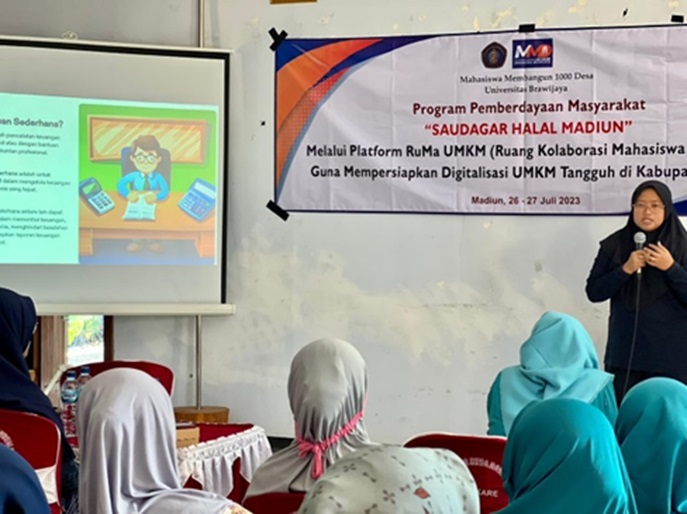Program Pemberdayaan Masyarakat “Saudagar Halal Madiun” pada UMKM di Kabupaten Madiun Community Empowerment Program "Madiun Halal Merchants" for MSMEs in Madiun Regency
Main Article Content
Abstract
Lack of understanding of financial records can cause owners to have poor asset management skills. Apart from that, taxes for MSMEs are another problem for business actors. The existence of demands from the government regarding halal certification also means that business actors who sell food and drinks are required to obtain halal certification. The aim of this activity is that business actors can compile simple records of the business carried out, know their tax obligations, and be able to calculate the amount of tax paid themselves. Participants are expected to be able to have halal certification for their businesses, especially businesses with food and beverage products. Community empowerment was carried out in Madiun Regency on 26-27 July 2023. Participatory Action Research (PAR) is used in this community service. Community empowerment is carried out through skills training, counseling, and development of micro, small, and medium enterprises (MSMEs). In this method, participants will make and learn from changes made in the training process. Simple bookkeeping training, MSME taxation, and submission of halal certification are the three sessions that make up the activities. In conclusion, MSME owners still need financial records written on paper, and most still need to try to record them. Most participants have small gross receipts or businesses with gross receipts of less than Five hundred million per year, so companies are not subject to MSME tax. Participants' enthusiasm grew when they helped apply for halal certification.
Downloads
Article Details

This work is licensed under a Creative Commons Attribution-ShareAlike 4.0 International License.
Authors who publish with this journal agree to the following terms:
- Any article on the copyright is retained by the author(s).
- Author grant the journal, right of first publication with the work simultaneously licensed under a Creative Commons Attribution License that allows others to share work with acknowledgment of the work authors and initial publications in this journal.
- Authors are able to enter into a separate, additional contractual arrangements for non-exclusive distribution of published articles of work (eg, post-institutional repository) or publish it in a book, with acknowledgment of its initial publication in this journal.
- Authors are permitted and encouraged to post their work online (e.g., in institutional repositories or on their websites) prior to and during the submission process, as can lead to productive exchanges, as well as earlier and greater citation of published work.
- The article and any associated published material is distributed under the Creative Commons Attribution-ShareAlike 4.0 International License
References
Abdul, M., Ismail, H., & Mustapha, M. (2013). Halal Food Certification: Case of Malaysian SME Entrepreneurs. 12(2), 163–173. https://doi.org/10.17265/1537-1514/2013.02.007
Afandi, A., Laily, N., Wahyudi, N., Umam, M. helmi, Kambau, R. A., Rahman, S. A., Wahyudi, J. 2022. Metodologi Pengabdian Masyarakat. Retrieved from http://diktis.kemenag.go.id
Ahmadiyah, A. S., Sarno, R., Anggraini, R. N. E., Ariyani, N. F., Munif, A., & Hidayati, S. C. 202). Pendampingan Pengurusan Ijin Edar dan Sertifikasi Halal Produk Usaha Mikro dan Kecil. Sewagati, 6(3). https://doi.org/10.12962/j26139960.v6i3.248
Akim, A., Konety, N., Purnama, C., & Adilla, M. H. 2018. Understanding of Micro, Small and Medium Enterprises (MSMEs) in Jatinangor on the Obligation of Halal Certification in Food Products. Kumawula: Journal of Community Service, 1(1), 31–49. https://doi.org/10.24198/kumawula.v1i1.19258
Arviana, G. N. 2023. UMKM: Definisi, Kriteria, hingga Peran dan Kondisinya di Indonesia. Retrieved August 10, 2023, from https://glints.com/id/lowongan/umkm-adalah/
Author. (n.d.). Pencatatan Keuangan Sederhana bagi UMKM – Departemen Manajemen IPB. Retrieved August 16, 2023, from https://manajemen.ipb.ac.id/pencatatan-keuangan-sederhana-bagi-umkm/
Ayyub, R. M. 2015. Exploring perceptions of non-Muslims towards Halal foods in UK. British Food Journal, 117(9), 2328–2343. https://doi.org/10.1108/BFJ-07-2014-0257
Ginee. 2021. Pencatatan Keuangan Sederhana untuk Usaha Kuliner Mikro - Ginee. Retrieved August 10, 2023, from https://ginee.com/id/insights/pencatatan-keuangan-sederhana/
Gunawan, S., Darmawan, R., Qadariyah, L., Wirawasista, H., Firmansyah, R., Hikam, M. A., Nopember, S.2020. Pendampingan Produk UMKM di Sukolilo menuju Sertifikasi Halalan Thayyiban. Sewagawati. 4(1) 14–19.
Hartono, H., & Hartomo, D. D. 2016. Faktor-Faktor Yang Mempengaruhi Perkembangan Umkm Di Surakarta. Jurnal Bisnis Dan Manajemen, 14(1), 15. https://doi.org/10.20961/jbm.v14i1.2678
Kompasiana. 2023. Sertifikasi Halal Penting bagi UMKM - Kompasiana.com. Retrieved August 16, 2023, from https://www.kompasiana.com/kkntematikuinsaizu52/64db0de3633ebc75e42e4872/sertifikasi-halal-penting-bagi-umkm
Lathifa, D. 2023. Berapa Tarif Pajak UMKM Tahun 2022. OnlinePajak. https://www.online-pajak.com/tentang-ppn-efaktur/pajak-umkm-2022#
